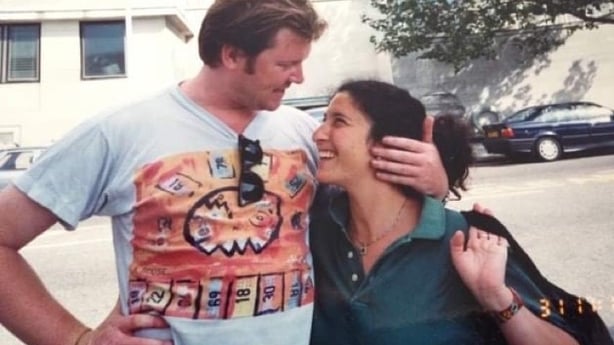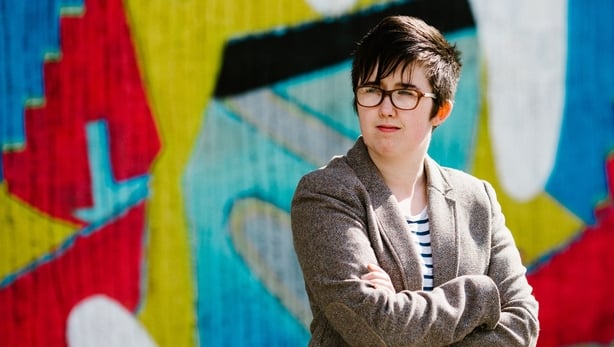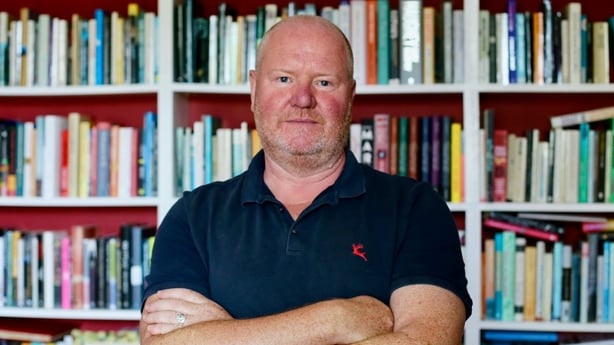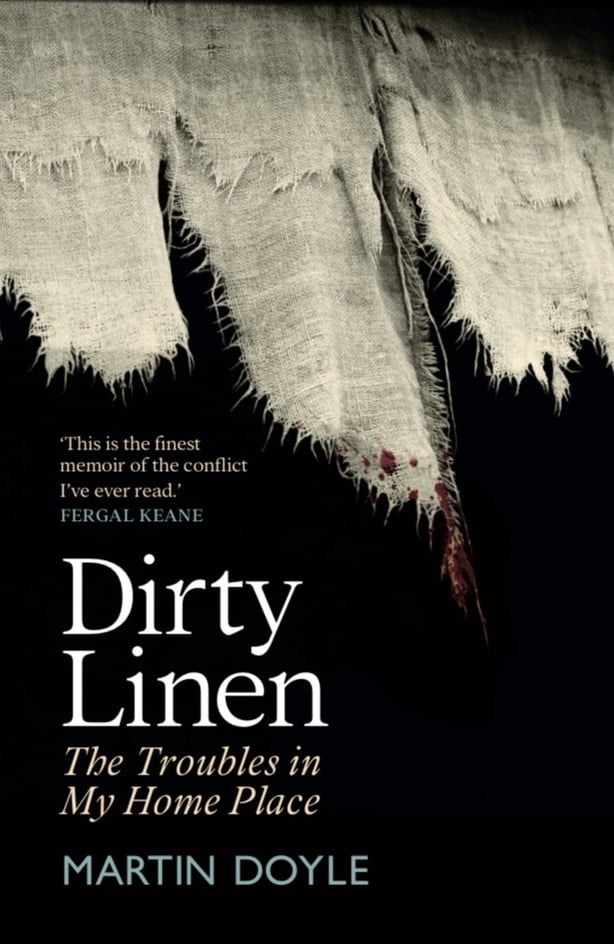We present an extract from Dirty Linen, the new book by Irish Times Literary Editor Martin Doyle.
Dirty Linen is a personal, intimate history of the Troubles seen through the microcosm of a single rural parish, the author's own, part of both the Linen Triangle – heartland of the North’s defining industry – and the Murder Triangle – the Badlands devastated by paramilitary violence.
When my neighbour Pat Feeney was murdered in February 1989 for the crime of being a Catholic, set up by a Protestant colleague while working as a night-watchman at Liddell's linen mill in Donaghcloney, I was a 21-year-old student at the University of St Andrews in Scotland. As this was long before the era of the mobile phone, I only found out about what had happened a few days later, when my cousin Julie came to visit for a student ball.
I keenly remember the feeling of survivor’s guilt that not only had I got away, while one of those left behind had been so cruelly, pointlessly murdered, but worse, that I had been oblivious to the atrocity. As I imagined the crowd of mourners at Pat’s funeral, my own black-tie event seemed obscenely frivolous.
My English girlfriend shared with me that evening the story of a school friend, Nikki, whose family had suffered a similar tragedy to the Feeneys. Strange how the world turns. In London, years later, I would meet Nikki; we would fall in love and become husband and wife. Together we would create a new family. I thought that Nikki’s tragic past, which she had overcome with such resilience and courage, would magically inoculate us from future misfortune. I was wrong.
When Nikki died of cancer in November 2013, at the age of 48, leaving our three young children behind, I raged at the casual cruelty of life but I also dimly sensed the one-ness of humanity, that this was our common fate.
Bereavement in the early days is like being caught in a flood. You force yourself to float so as to cope with the knowledge of the depths below you. But as the waters over time recede, the challenge changes to one of conservation, the suddenly urgent need to construct irrigation channels to preserve the precious memories that earlier had threatened to overwhelm you.

I believe instinctively in the power of storytelling and the healing power of nurturing, not neutering, the memories of loved ones we have lost. There is no cure for some trauma. There is only care. And often that can, must be enough.
'The people we most love do become a physical part of us, ingrained in our synapses, in the pathways where memories are created.’ I love this idea, the words of a psychiatrist quoted by the American writer Meghan O’Rourke in The Long Goodbye, her memoir of grieving for her mother. O’Rourke writes beautifully and honestly about her loss.
‘I think about my mother every day,’ she writes, ‘but not as concertedly as I used to. She crosses my mind like a spring cardinal that flies past the edge of your eye: startling, luminous, lovely, gone. It’s not a question of getting over it or healing. No; it’s a question of learning to live with this transformation … It’s not an emergence from the cocoon, but a tree growing around an obstruction.’
***
The Troubles cast a long shadow over my childhood and played an important part in my first decade as a journalist in London. While I never fully moved on and switched off, it would be fair to say that the peace, however imperfect, that led to and followed the Good Friday Agreement in 1998 afforded me the luxury of no longer dwelling so obsessively on the daily machinations and frustrations of politics in the North.
Brexit changed all that. Pursued by British politicians who cared little for its potential consequences for Northern Ireland and championed by many unionists, who seemed to positively relish its potential to destroy the common ground that the Common Market and its European Union successor had fostered, Brexit dismantled the EU framework that provided a shared European home for rival national identities.
The elite behind the Leave campaign remind me of F. Scott Fitzgerald’s line in The Great Gatsby: ‘They smashed up things and creatures and then retreated back into their money or their vast carelessness, or whatever it was that kept them together, and let other people clean up the mess they had made.’ (And yes, working-class paramilitaries and soldiers were far more careless with people’s lives.)
The violent death of journalist and writer Lyra McKee on the eve of Good Friday in 2019 also sent me back to the past. Only the month before, I had featured her in an article ‘Best of Irish: 10 Rising Stars of Irish Writing’.
‘We were the Good Friday Agreement generation, destined to never witness the horrors of war but to reap the spoils of peace. The spoils just never seemed to reach us,’ she had written. Now, twenty-one Good Fridays later, she too was dead. I wrote, ‘The senseless shooting dead of journalist and author Lyra McKee by dissident republicans in Derry last night feels like the worst of our past reaching out its cold, dead hand to rob us of the best of our future.

‘To paraphrase L.P. Hartley, for violent extremists of whatever shade, bitter orange or bile green, the past is not a foreign country. It is the only country they know and love and they are seemingly incapable of doing things differently, i.e. living and letting live in peace. All we can do as a society is protect ourselves from them and provide a better example. Lyra McKee represented the future, another country, a better one.’
When the Belfast writer Paul McVeigh asked me to contribute to The 32: An Anthology of Irish Working-Class Voices, I agreed on the understanding my thesis would be that, as a Catholic growing up in the North in the 1970s and 1980s, the prejudice I had faced had far more to do with my religious and ethnic identity than my class. No one ever called me a working-class bastard.
The resultant essay, ‘Dirty Linen’, wove a thread that linked the expulsion of Catholics including my grandfather and his sister from a local linen works in 1920 to Pat Feeney’s murder at a linen mill in 1989. The essay also chronicled other Troubles murders in my parish, including the killings of three members of the O’Dowd family in January 1976. Declan, who was only 19 when he was murdered along with his brother Barry and uncle Joe, had been our coalman. His father, Barney, who was also shot but had survived, had been our milkman and we all loved him.
The O’Dowd family moved South and I didn’t see Barney again until ‘Dirty Linen’ was published in The Irish Times in May 2021. Barney’s son Noel made contact and brought me to meet Barney and his family. It was a very moving experience and as I listened to Barney and Noel tell their remarkable stories, I felt compelled to write about them. Noel offered to show me the family farmhouse, abandoned since the murders forty-five years before, and as we drove around the parish, he pointed out the sites of other atrocities. In January 2022, to mark the anniversary of the O’Dowd murders, The Irish Times published my essay, ‘A Ghost Estate and an Empty Grave’.
Conversations with Tullylish neighbours, sparked by my first attempts to share their loss, made me feel there was much more to be told. In the same way perhaps that a writer knows that their short story must be a novel as it cannot be satisfactorily told in a few thousand words, I realised that the O’Dowds’ story alone and the parish’s other tragedies required a longer form.
I have never walked in the funeral cortège of a Troubles victim or watched their coffin being lowered into the ground. But having visited the graveyard where the O’Dowds had been buried and having paid my respects at the graves of the other victims buried there, I resolved to bear in mind these dead, to attempt to celebrate their lives and record their tragic deaths, which stole not just who they were but what they could have become.
Victims and their families are at the heart of this book. While working on it, I was often asked whether I found the conversations and the subject matter difficult. I usually answered that I found it deeply moving rather than distressing. It was akin to attending a wake or a funeral. Any sadness I felt was as nothing compared to the life-long grief of the neighbours who were sharing their stories. I believe that the very least I – we – owe them is our time, the time it takes to listen to what they went through and are still going through.
When Nikki was being buried, the celebrant invited close relatives to scatter earth upon the coffin. Her cousin Graham seemed not to know how to handle a spade, turning the blade upside down. I knew he was a city boy but this was ridiculous. I learned, however, that this was a Jewish tradition, symbolising the alien nature of the task, perhaps also the reluctance to let a loved one go. We should be similarly reluctant to bury memories of the Troubles. It might seem perverse, like writing with the reverse side of a nib, but difficult stories are often the most important ones to tell, despite or perhaps because of the pain they contain.

It is humbling for me to contemplate as an adult that people I knew as neighbours when I was growing up had been afflicted by such terrible loss and bore it with such dignity. I have tried to record the toll the Troubles took on my parish and the long tail of trauma it has left behind.
I preface these emotionally powerful stories with my own account of growing up during the Troubles, and of the community of which I was part, conveying the texture of ordinary life, drawing on my own family history to give a sense of the before times as well as putting events in their broader historical and cultural context.
I have sought where possible not to inject humour but rather not to exclude it, because it is what makes us human, it is how we cope. The people I grew up with are not dour. They are yarn-spinners who love nothing more than a good story.
Memories can be both precious and painful, like walking barefoot on diamonds. But to be forgotten is to die a second time.

Dirty Linen is published by Irish Academic Press.

